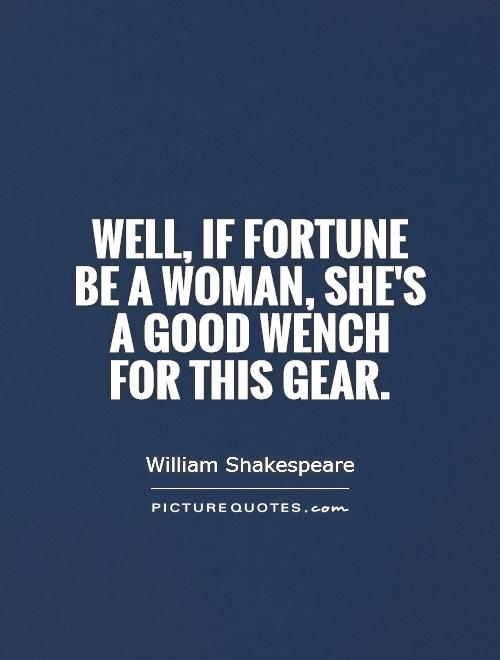Well, if Fortune be a woman, she's a good wench for this gear

Well, if Fortune be a woman, she's a good wench for this gear
The quote "Well, if Fortune be a woman, she's a good wench for this gear" is from William Shakespeare's play "The Merchant of Venice." In this context, the character Gratiano is speaking to his friend Bassanio about the unpredictability of luck and fate.The phrase "Fortune be a woman" refers to the idea that luck and chance are often personified as a woman in literature and mythology. In this case, Gratiano is suggesting that if Fortune is indeed a woman, she is being favorable to them in their current situation. The term "wench" was commonly used in Shakespeare's time to refer to a young woman or girl, often with a connotation of playfulness or mischief. By calling Fortune a "good wench," Gratiano is implying that she is being kind and generous in their circumstances.
The word "gear" in this context can be interpreted as referring to their current situation or the events that are unfolding. Gratiano is acknowledging that they are in a fortunate position, and he attributes this luck to Fortune being on their side. This line reflects the theme of fate and fortune that runs throughout the play, as the characters grapple with the idea of destiny and the role it plays in their lives.
Shakespeare often used gendered language and imagery in his plays to explore themes of power, control, and relationships. In this case, the personification of Fortune as a woman adds a layer of complexity to the characters' understanding of luck and fate. By characterizing Fortune as a woman, Shakespeare invites the audience to consider the ways in which gender influences our perceptions of luck and chance.
Overall, this quote from "The Merchant of Venice" highlights the characters' reliance on luck and fate to guide their actions and decisions. It also demonstrates Shakespeare's skill in using language and imagery to explore complex themes and ideas in his plays.












 Friendship Quotes
Friendship Quotes Love Quotes
Love Quotes Life Quotes
Life Quotes Funny Quotes
Funny Quotes Motivational Quotes
Motivational Quotes Inspirational Quotes
Inspirational Quotes